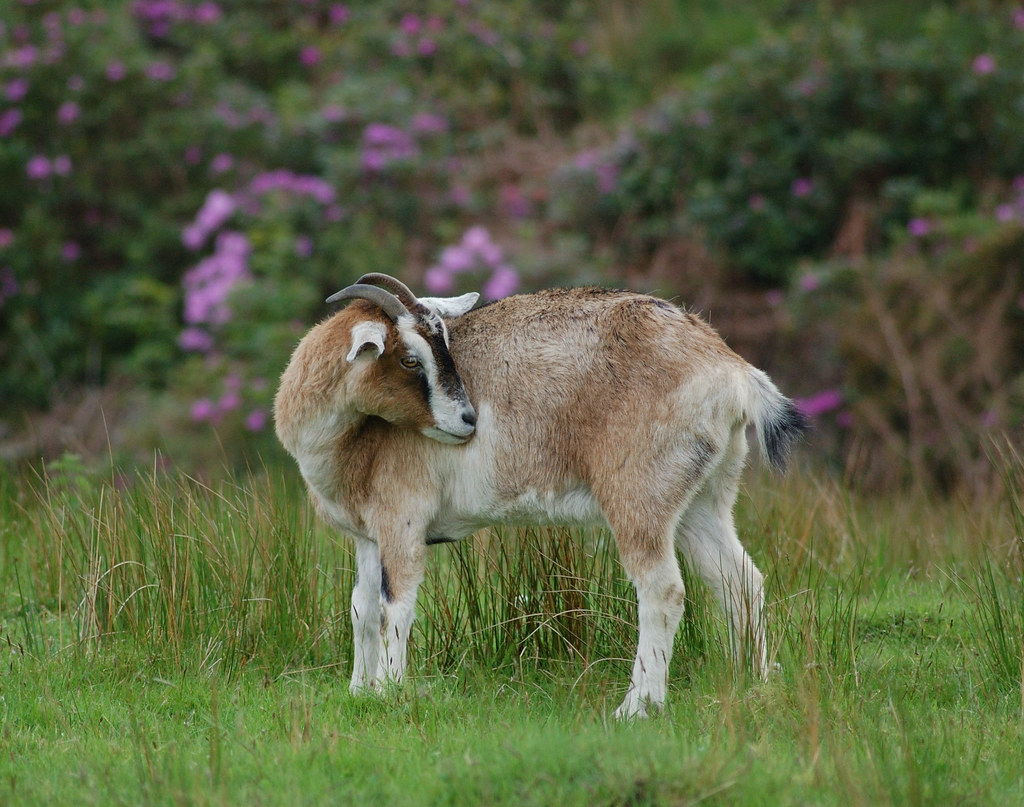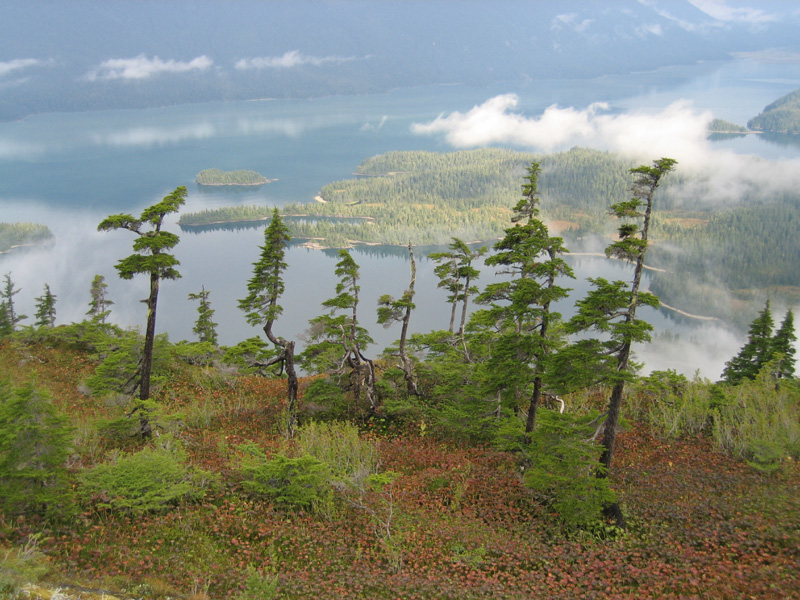
Mountain Hemlock (Tsuga mertensia), Alpine Lakes Wilderness, Washington: photo by Walter Siegmund, 26 September 2007
Red house. Green tree in mist.
How many fir long hours.
How that split wood
warmed us. How continuous.
Red house. Green tree I miss.
The first snow came in October.
Always. For three years.
And sat on our shoulders.
That clean grey sky.
That fine curtain of rain
like nice lace held our faces
up, in it, a kerchief for the nose
of softest rain. Red house.
Those green mists rolling
down the hill. Held our heads
when we went walking on the hills
to the side, with pleasure.
But sad. That's sad. That tall grass.
Toggenburg goat stood in, looking, chewing.
Time was its cud.
Red barn mist of our green trees of Him
who locks our nature in His deep nature
how continuous do we die to come down
as rain; that land's refrain
no we never go there anymore.
Edward Dorn: Hemlocks, 1959, from Hands Up! (1964)

Farmland, Skagit County, Washington: photo by Drums600, 26 July 2008

Toggenburg Goat: photo by RoseBridger, 28 May 2009

Toggenburg Goat: photo by Frances Taylor, 21 February 2011

Mountain Hemlock (Tsuga mertensia), Prince William Sound, Alaska: photo by Erin McKittrick, 14 May 2005
"We bought her [a Toggenburg goat, named Nanny] at a farm auction, thinking of sustenance but of course she became a pet. I even learned to milk her! The kids hated her milk but liked the cheese I made from it. We let her roam free in the yard and she used to come up when I was sitting out on the steps having a cup of coffee and chew on the buttons of whatever I was wearing. Goats are wonderful. Nanny gave us a lot of laughs and provided food as well. We got a billy goat to keep her company and provide us with kids, which he did... But taking them to be slaughtered was a nightmare. The billy goat tolerated me but did NOT like Ed. He peed on him whenever he approached, and billy goats have enormous pee power! We finally had to get rid of him. The house in Burlington had been a small farm at some point and we used it as such. The barn housed chickens, had a rabbit hutch outside, an we had a garden on the road side of it. We did, literally 'live off the land.''"
-- Helene Helmers Dorn, in TC: Edward Dorn: A World of Difference, 2002



11 comments:
taking them to be slaughtered was a nightmare
Good!
Nice goats, though.
Artur,
Your fellow goat lovers here feel exactly the same way.
But, to be fair, that was part of a curious form of make-it-up-as-you-go subsistence farming in which the impoverished poet and his family were engaged.
Helene's retrospective comments suggest that misgivings about the slaughter of the innocents haunted her even at the time.
(And you must concede she gives credit where due, when it comes to the peeing-power!)
Tom
Hemlocks! What a beautiful poem.
Its snowing everywhere in Himachal Pradesh (not my house tho. We live in low lying areas.)
And what sounds! Beautiful.
And how continuous Tom. This life.
To read-
The only immediate res of the poem are its sounds.
by Robert Duncan and to hear them here.
PS- Also reminds me of HB (you remember?). She was ruminating once at yr blog-
Maybe we should all evaporate and rain down again.
I wonder if she had read this poem. But beautiful, don't you think?
Time is our cud too. And Helene knew this I suppose.
Beautiful post Tom. Thanks.
Yes, I concede.
Artur.
Having spent most of my adolescent years in and around hemlock, fir and cedar country—then better known as Weyerhaeuser World, Pacific County, Washington State, this particular post stirs up sweet memories, to wit:
My best friend’s dad was a saw-filer before opening up the first Dairy Queen in Raymond and one of the hardest drinking, most intelligent Finns around, proud of his self-taught learning. He always enjoyed telling anybody who wanted to listen the story of his asking the Greek owner of one of the local taverns the following question in front of a bar packed with loggers eager for edification: “Jim, you’re a descendent of the ancient Greeks, so you should know—who drank the hemlock?”—only to get this most audaciously logical answer in return: “Weyerhaeuser!!!”
Aditya, this wonderful poem offers you many thanks, my poet friend.
Artur, let us amicably exchange concessions, then.
Vassilis, I did remember your origins in the course of working up this post. During Dorn's stay in the Northwest, during which he briefly held a series of casual and temporary jobs, he did indeed put in a period as a lumberjack, working for Scott Paper. For a farm lad from Illinois, that was challenging work, to be sure. But he took on whatever he could get. There was a spell of working on a chicken farm, a stint in construction at Sedro-Woolley, & c.
Were he still with us, and we could all miraculously gather, I'm sure you and he would have had some stories to trade and share.
Tom,
Mountain Hemlock (Tsuga mertensia -- beautiful Latin name around the "Red house. Green tree in mist." Goat in the yard chewing on Helene's buttons, peeing on Ed -- what an idyllic scene it all seems to be. . . .
1.14
light coming into sky above still black
ridge, waning moon across from branches
in foreground, wave sounding in channel
and by means of an act, but
that it in its recent
being abstract, at the same
time, music as object
sunlight reflected in windblown channel,
line of jet trail in cloudless blue sky
Echoing Aditya: "And what sounds." This has been my soundtrack of the day. Curtis
My Oregon Self
Stand of Ponderosa at Rickreall
two massive old ones—gateway to Oregon.
I feel like I am in a quandary. Bright fuchsia rhododendrons.
Snow-laden breeze. Italian workers cottage my parents own.
Their future. Their place of rest. Until they die,
it will be their home.
Also, the place that I realized. New aspen trees planted
on the slope behind Super 8. They are reaching the highway air,
exchanging it. The best things in life are free. All the time, there’s
the other and the other best. I’ve missed myself. My Oregon self.
Is nutty. Is whimsical. Is 89 years old. The next day, I’ve become
my other self.
I’ve longed for more. But, what is more? More—
there’s more time, in a little drawer.
A great rest followed me here. It caved-in. It supposed a different
decision. A made-up land. The other sort of reminder pulled aside.
A thimble remaining behind.
Perhaps a clock. Barging ahead, behind, a hidden platform.
A Hemlock, a Fir.
Meeting Ed
Ed knew it was important to say goodbye to me—I’m not sure how he knew this, as he was dying, or did Jenny write the postcards for him? They have the same handwriting—and use those great ink pens, real dark and fresh and professional. Those pens that are strong and clear and important. I just needed every last bit of attention from Ed. I did. The few lines sustained me, kept me going those last dreary, stressful years with Adam. How I made it through, I do not know or realize but just that contact with the poetry world helped me to survive, keep going in the now. I did not want to stay so isolated, despite living in Hawaii, despite not being able to afford lots of trips home to Oregon. Stuck but not stuck, the self that complied.
Ed, watching how I did things, my poker face.
The most unusual things coming from his mouth. His laugh. Who was he?
A humble celebrity? Ed, who were you, really? An unhappy, bitter man? A man in awe of life.
Cruel, ironic comments. Acerbic LOL. Sarcastic does not describe. Then, the poet, poetry. The lightness, the transformation. Real magic, all these words. There is no place for them to stick or even think about sticking. The haunts, the daydreams I’ve had—me, my loneliness then.
They may be cold now, those postcards, ten years later. They may be easier to look at. They could be.
All that work. Somehow, it was a lot—of course, bowing down to poetry. Bow down to the way it goes or can go. Because poetry is important.
Yes. Ha, ha, ha. That’s what all the fun was, what it all was for. All the worry—pledging to it, finally, endlessly. Promising poetry that you will serve it?
Steve,
Idyllic it does seem in imaginal retrospect, but, from what I gather, things were actually a bit ragged around the edges, at the time. (Poverty, medical troubles for Helene, among other inconveniences...)
Curtis,
About the sound structure here -- quite sophisticated, really -- you might be interested to know that when Denise Levertov published this poem in The Nation, a New York attorney named Harold Cammer wrote to E.D. to say he was unable to "see why it was published as a poem".
(For a poet of real originality, in any age, it's uphill all the way.)
Susan,
Another wonderful poem. We are humbled.
I’ve longed for more. But, what is more? More—
there’s more time, in a little drawer.
(Sometimes, these days -- well, nights, my form of day -- bumbling in the dark, I can't find that drawer...)
I got those postcards too.
Post a Comment